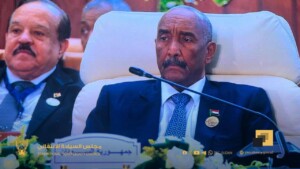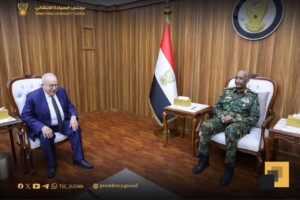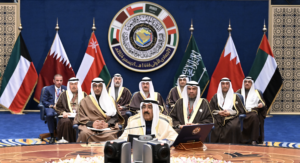Rebel leaders join Sudan Sovereignty Council
The rebel leaders Malik Agar, El Hadi Idris and El Taher Hajar have been sworn in as members of Sudan’s Transitional Sovereignty Council yesterday. Their appointment is part of the implement of the Juba Peace Agreement, signed by the Sudanese government and armed rebel movements in the South Sudanese capital Juba in October 2020.
 The three rebel leaders sworn in as members of the Sovereignty Council in front of Sovereignty Council president Lt Gen Abdelfattah El Burhan and Chief Justice Nemat Abdallah Kheir (SUNA)
The three rebel leaders sworn in as members of the Sovereignty Council in front of Sovereignty Council president Lt Gen Abdelfattah El Burhan and Chief Justice Nemat Abdallah Kheir (SUNA)
Rebel leaders Malik Agar, El Hadi Idris, and El Taher Hajar have been sworn in as members of Sudan’s Transitional Sovereignty Council yesterday. Their appointment is part of the implementation of the Juba Peace Agreement, signed by the Sudanese government and a number of rebel movements in the South Sudanese capital Juba in October 2020.
El Hadi Idris, chairman of the Sudan Revolutionary Front (SRF) rebel alliance and leader of the Sudan Liberation Movement-Transitional Council (SLM-TC), said in a press statement following the ceremony that Sudan is passing through “a delicate historical stage and faces great challenges which require the cooperation of different partners”. Implementing the Juba Peace Agreement is a priority for the democratic transformation, he added.
Malik Agar, leader of the Sudan People’s Liberation Movement-North (SPLM-N Malik Agar), stated that the Sovereignty Council will “serve the interests of all Sudanese to achieve the goals of the December Revolution”. He called on everyone to work together to lay down a roadmap that will lead the country away from conflict and towards reconciliation. Some parts of Sudan are still bleeding, he said, and this must be stopped by implementing the Juba Peace Agreement. Obstacles to the Juba Peace Agreement must be removed and a Security Arrangements Committee must be formed.
El Taher Hajar, leader of the Sudan Liberation Movement for Justice-Karbino (SLMJ-K), said that the swearing in represented “a historical moment and an important stage of the transitional period as it added different political experiences and visions”. He said that it is in the interest of Sudan because “it allows parties to participate that previously did not take part in the political dialogue”. In his view, this is the “the entry point for resolving all major issues in Sudan”.











 and then
and then